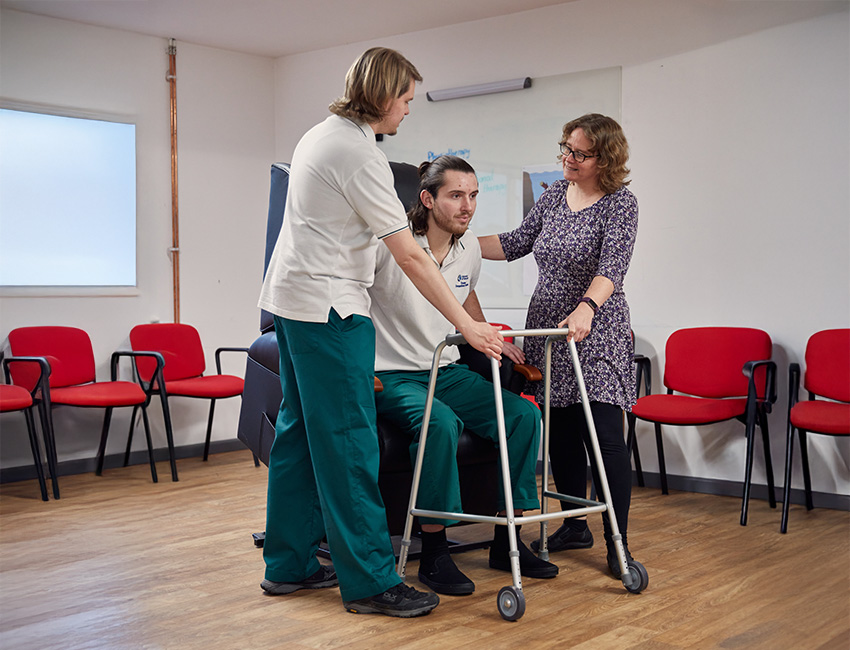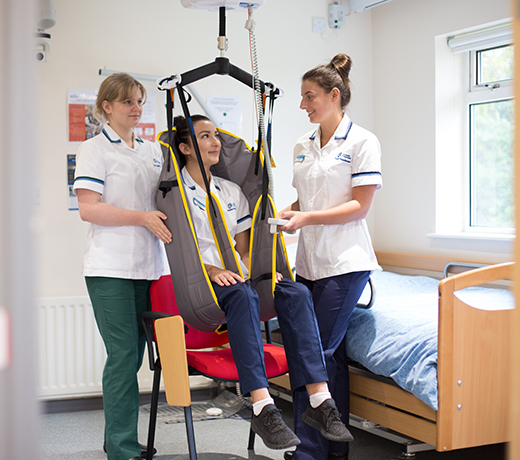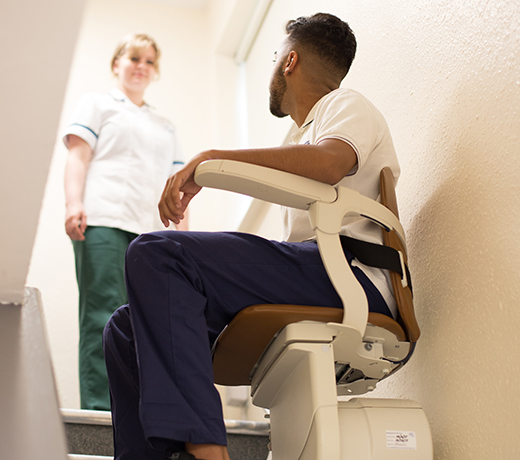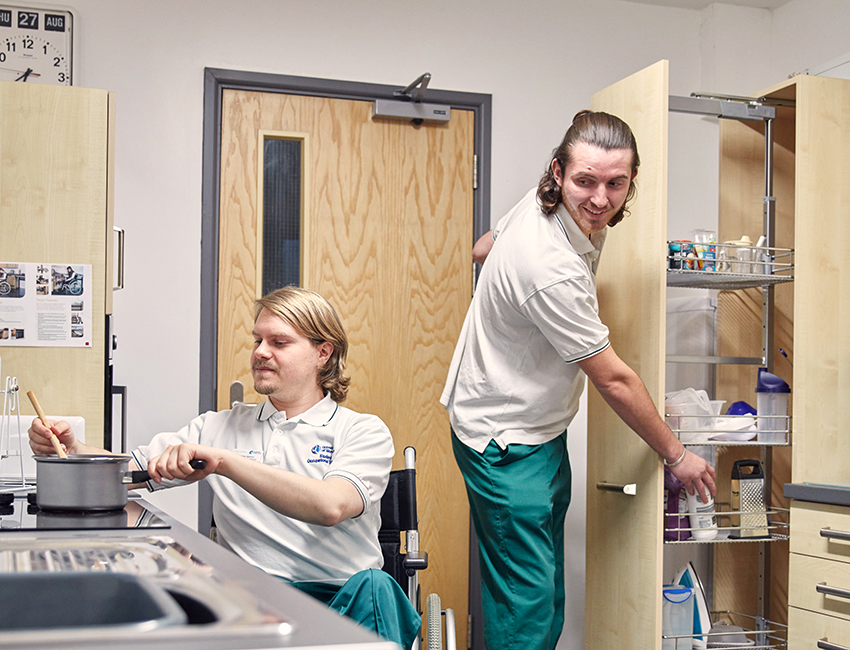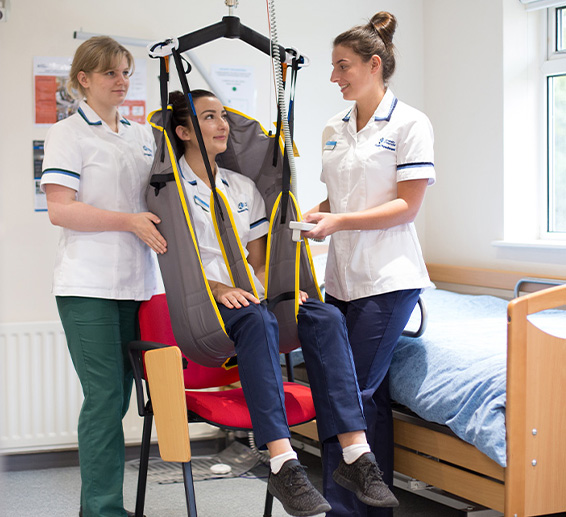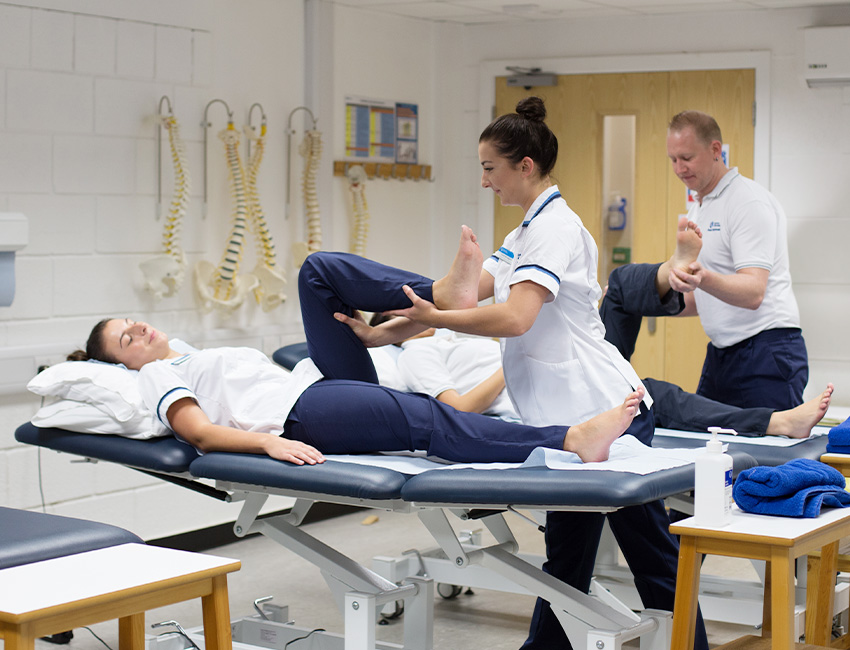At Worcester, you'll learn from experienced, qualified occupational therapists and complete a minimum of 1,000 hours on professional placements. You'll prepare for real-world practice in our specialist skills simulation facilities and a specially adapted house, featuring modified kitchens, bathrooms, and bedrooms.
for student satisfaction
grant that you won't need to pay back
This means that when you graduate, you can register with the HCPC to practice under the protected title of occupational therapist.
Overview
As an occupational therapist, you'll empower others, build confidence and help people reclaim their independence for the moments that matter most. These might be due to physical or mental health conditions, learning differences, age-related changes, life transitions (such as becoming a parent or retiring), trauma, or a combination of social and personal factors. Your role is to support people in doing the things that matter most to them, whether that’s returning to work, managing at home, or engaging in hobbies and relationships.
This might involve helping someone learn new ways to carry out daily activities, supporting them through recovery, or making changes to their environment to make everyday tasks more manageable. You’ll work with individuals, families, and communities, sometimes one-on-one and sometimes in groups. Occupational therapists work in a wide range of settings, including people’s homes, hospitals, schools, prisons, charities, and social care services.
Our course is designed for graduates from disciplines other than occupational therapy who wish to become qualified occupational therapists. Unlike the BSc (Hons) Occupational Therapy, which runs over three years with teaching between September and May, this MSc offers an accelerated, two-year route into the profession. Your time will be split between studying the theory in lectures, practising your skills in practical hands-on sessions, and putting what you've learned into practice on placement.
You'll have sessions in Ability House – a converted house with specialist adaptations made to the kitchen, bathroom, and bedrooms. This allows you to practise your skills in a realistic and supportive setting. You’ll also work closely with service users and carers throughout the course, ensuring your learning is grounded in lived experience.
At Worcester, our assessments are designed to reflect the realities of professional practice, supporting your transition into a new career with confidence. As a postgraduate student, you’ll be encouraged to carry out your own research and write for publication, developing the critical thinking and communication skills expected at this level. You’ll study alongside students from other health and social care professions, such as physiotherapy, preparing you to work collaboratively with teams you’ll encounter in practice.
Placements
By the end of this course, you will have undertaken at least 1000 hours of assessed professional practice. Our dedicated therapy placement team organise this for you, giving you a range of different experiences throughout the course.
Recent placements have included occupational therapy roles in:
- NHS and private hospitals
- Adult social care
- Community mental health or learning disability teams
- Residential mental health facilities
- Postural case services
- Woodland therapy settings
- Community rehabilitation teams
- Schools, both mainstream and specialist
- Charities and businesses
- Specialist equipment suppliers and services
- Project and research based placements
What is occupational therapy?
Course content
On this accredited course you’ll study theories backed up by substantial evidence and will then apply this learning in professional practice.
Throughout the course you’ll gain a broad range of experience in the field, with experienced occupational therapists supervising you as you complete 1,000 hours of placement in different therapeutic settings.
All modules are mandatory to ensure you’re eligible to register as an occupational therapist with the HCPC.
We regularly review our courses to reflect the latest research and developments in the subject area, as well as feedback from students, employers and the wider sector. As a result, modules may change to ensure the course remains current and relevant.
Careers
Our course is designed for graduates from a wide range of disciplines who are ready to become an Occupational Therapist. Through a blend of academic study, hands-on skills development, and real-world placements, you’ll gain the knowledge and experience needed to qualify.
As an Occupational Therapist, you can work across a wide range of environments, including:
- NHS and private healthcare facilities
- Educational settings such as schools
- Adult social care environments
- Mental health, learning disability, and postural care services
- Outdoor therapy centres
- Providers of specialist equipment and home modification services
- Individuals’ homes and within community-based services
- Charities and third sector organisations including working with people displaced by war and natural disasters
Occupational therapists focus on the unique needs of each person rather than categorising them by diagnosis or specialty. The majority of our graduates secure roles in their preferred area of practice. While many begin their careers in the NHS or social care, others pursue opportunities with charities or in private healthcare settings.
Our course is accredited by the World Federation of Occupational Therapists, enabling you to explore career opportunities internationally as well.
Course highlights
Teaching and assessment
Teaching is a mix of interactive seminars, lectures, one-to-one tutorials and practical skills sessions. Your assessments will help prepare you for a career as an occupational therapist, and include writing reflective essays, engaging in group debates, creating a health promotion plan and designing a training package.
Teaching and assessment contents
The MSc Occupational Therapy (Pre-registration) programme employs a broad approach to teaching. Whilst teaching is predominantly campus based, all modules will include synchronous lectures, seminars, and workshops, as well as asynchronous online delivery. The specific blend of campus based and online teaching will vary across the modules. Full details are available in module outlines. Constructive alignment of the programme aims, module aims, module content, learning and teaching methods and assessments, support and scaffold the development of advanced academic skills, across the two years of the course. Teaching and learning are student-centred, reflecting the philosophy of knowledge construction whereby students are active participants in their learning experience, and learn with and from each other. Academic modules consist of specific MSc Occupational Therapy (Pre-registration) modules that can only be taken by occupational therapy students (prefixed OCTH), and shared modules with MSc Physiotherapy (Pre-registration) students (prefixed ALHS). Shared modules provide valuable opportunities for interprofessional learning, where you will be able to articulate their professional roles and contribution to integrated and inter professional care, and develop collaborative skills, through learning together. Delivery of learning sessions are inclusive, providing varied opportunities for learning through active participation in learning activities designed to enable students to achieve the modular learning outcomes. We seek to retain a ratio of 1:15 for all practical skills sessions.
Practice based learning, in the form of placements across the curriculum provides direct experience of working with service users and within professional teams. You are supported by practice educators to achieve the required level of competency and develop your use of complex professional reasoning. Service users and carers are integral to teaching and learning, contributing to development, delivery and evaluation of teaching sessions.
Interactive seminars and workshops take a variety of formats and are intended to enable the application of learning through critical discussion and student-centred activities. Practical sessions are focused on developing occupational therapy and practice specific skills.
Before the course begins, you will receive a comprehensive induction to help you settle in and prepare for your studies.
Meet the team
You will be taught by a teaching team whose expertise and knowledge are closely matched to the content of the modules on the course.
Entry requirements
You'll need a degree at 2:2 or above with evidence of knowledge or experience in the research process and / or completion of an undergraduate dissertation or independent study.
Any questions?
If you have any questions about entry requirements, please call our Admissions Office on 01905 855111 or email admissions@worc.ac.uk.
Fees
Fees contents
UK and EU Students
In 2026/27 standard fee for full-time home and EU students enrolling on MSc Occupational Therapy (Pre-registration) is £9,790 per year (subject to changes in the government tuition fee cap).
Tuition fees are reviewed annually and may increase each year for both new and continuing students.
For more details on course fees, please visit our course fees page.
International students
In 2026/27 standard fee for full-time international students enrolling on MSc Occupational Therapy (Pre-registration) is £23,100 per year.
Tuition fees are reviewed annually and may increase each year for both new and continuing students.
For more details on course fees, please visit our course fees page.
How to apply
How to apply contents
Please make your application via our online application form. If you have any questions about applying, please contact our Admissions office on 01905 855111 or admissions@worc.ac.uk.
Contact
If you have any questions, please get in touch. We're here to help you every step of the way.


Dr. Terri Grant
Principal Lecturer in Occupational Therapy; MSc (Pre-registration) Occupational Therapy Course Lead
t.grant@worc.ac.ukAdmissions Office
admissions@worc.ac.uk01905 855111More to explore
Open Days
Visiting us is the best way to get a feel for student life at the University of Worcester.

The City of Worcester
Worcester is a welcoming university city with great transport links and plenty of student parking.

Accommodation
Benefit from our accommodation guarantee. We have rooms on campus to suit every budget including en-suite options.

